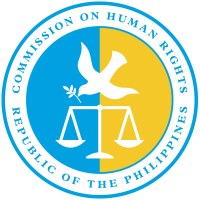Our website is made possible by displaying online advertisements to our visitors.
Please consider supporting us by disabling your ad blocker.
Commission on Human Rights (Philippines)
| Komisyon ng Karapatang Pantao | |
 Seal | |
 | |
| Agency overview | |
|---|---|
| Formed | May 5, 1987 |
| Jurisdiction | Philippines |
| Headquarters | Commonwealth Avenue, Diliman, Quezon City, Philippines |
| Annual budget | ₱958,963,000 (2023)[1] |
| Agency executive |
|
| Website | www |
 |
|---|
|
|
The Commission on Human Rights (Filipino: Komisyon ng Karapatang Pantao) (CHR) is an independent constitutional office created under the 1987 Constitution of the Philippines, with the primary function of investigating all forms of human rights violations involving civil and political rights in the Philippines.[2]
The commission was first founded and led by Chairperson José W. Diokno, a prominent lawyer and the father of human rights in the country, whom the surrounding park of the headquarters now known as the Liwasang Diokno (Diokno Freedom Park) was named after. Diokno also founded the premier human rights network called the Free Legal Assistance Group (FLAG). Furthermore, the hall inside the compound is called Bulwagang Ka Pepe or the Ka Pepe Hall, which features a sculpted bust and large mural of the late senator.
The CHR is composed of a chairperson and four members. Commissioners hold a term of office of seven years without reappointment. The Philippine Constitution requires that a majority of the commission's members must be lawyers. As a National Human Rights Institution, the Commission enjoys Status A or top accreditation by the Global Alliance of National Human Rights Institutions based on the 1993 Paris Principles.[3] It was announced on 1 July that The CHR will start accepting online complaints to make it easier and more accessible for Filipinos to seek assistance from the CHR. The portal will be operational starting 01 July 2024, marking a significant advancement in the delivery of human rights services in the country.[4]
- ^ "Commission on Human Rights Budget" (PDF). Department of Budget and Management. December 28, 2022. Archived from the original (PDF) on January 4, 2023. Retrieved January 4, 2023.
- ^ Section 18, Article XIII, Constitution of the Philippines
- ^ "Chart of the Status of National Institutions" (PDF). OHCHR.org. Retrieved May 19, 2017.
- ^ "CHR launches MISMO, the new online complaint and request portal for Filipinos – Commission on Human Rights, Philippines". chr.gov.ph. Retrieved July 1, 2024.
Previous Page Next Page


